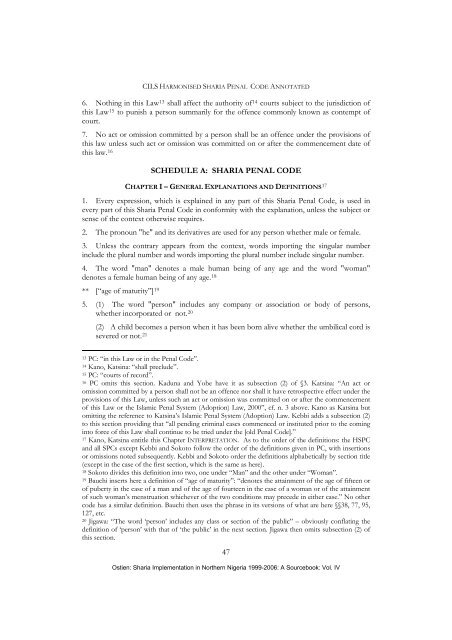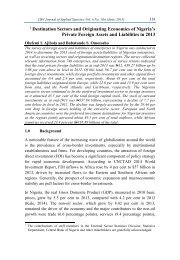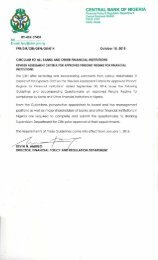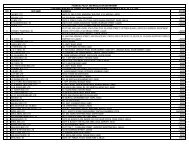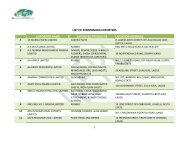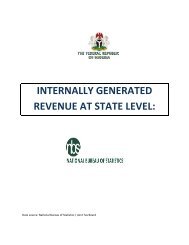vol_4_4_chapter_4_part_III
vol_4_4_chapter_4_part_III
vol_4_4_chapter_4_part_III
You also want an ePaper? Increase the reach of your titles
YUMPU automatically turns print PDFs into web optimized ePapers that Google loves.
CILS HARMONISED SHARIA PENAL CODE ANNOTATED<br />
6. Nothing in this Law 13 shall affect the authority of 14 courts subject to the jurisdiction of<br />
this Law 15 to punish a person summarily for the offence commonly known as contempt of<br />
court.<br />
7. No act or omission committed by a person shall be an offence under the provisions of<br />
this law unless such act or omission was committed on or after the commencement date of<br />
this law. 16<br />
SCHEDULE A: SHARIA PENAL CODE<br />
CHAPTER I – GENERAL EXPLANATIONS AND DEFINITIONS 17<br />
1. Every expression, which is explained in any <strong>part</strong> of this Sharia Penal Code, is used in<br />
every <strong>part</strong> of this Sharia Penal Code in conformity with the explanation, unless the subject or<br />
sense of the context otherwise requires.<br />
2. The pronoun "he" and its derivatives are used for any person whether male or female.<br />
3. Unless the contrary appears from the context, words importing the singular number<br />
include the plural number and words importing the plural number include singular number.<br />
4. The word "man" denotes a male human being of any age and the word "woman"<br />
denotes a female human being of any age. 18<br />
** [“age of maturity”] 19<br />
5. (1) The word "person" includes any company or association or body of persons,<br />
whether incorporated or not. 20<br />
(2) A child becomes a person when it has been born alive whether the umbilical cord is<br />
severed or not. 21<br />
13 PC: “in this Law or in the Penal Code”.<br />
14 Kano, Katsina: “shall preclude”.<br />
15 PC: “courts of record”.<br />
16 PC omits this section. Kaduna and Yobe have it as subsection (2) of §3. Katsina: “An act or<br />
omission committed by a person shall not be an offence nor shall it have retrospective effect under the<br />
provisions of this Law, unless such an act or omission was committed on or after the commencement<br />
of this Law or the Islamic Penal System (Adoption) Law, 2000”, cf. n. 3 above. Kano as Katsina but<br />
omitting the reference to Katsina’s Islamic Penal System (Adoption) Law. Kebbi adds a subsection (2)<br />
to this section providing that “all pending criminal cases commenced or instituted prior to the coming<br />
into force of this Law shall continue to be tried under the [old Penal Code].”<br />
17 Kano, Katsina entitle this Chapter INTERPRETATION. As to the order of the definitions: the HSPC<br />
and all SPCs except Kebbi and Sokoto follow the order of the definitions given in PC, with insertions<br />
or omissions noted subsequently. Kebbi and Sokoto order the definitions alphabetically by section title<br />
(except in the case of the first section, which is the same as here).<br />
18 Sokoto divides this definition into two, one under “Man” and the other under “Woman”.<br />
19 Bauchi inserts here a definition of “age of maturity”: “denotes the attainment of the age of fifteen or<br />
of puberty in the case of a man and of the age of fourteen in the case of a woman or of the attainment<br />
of such woman’s menstruation whichever of the two conditions may precede in either case.” No other<br />
code has a similar definition. Bauchi then uses the phrase in its versions of what are here §§38, 77, 95,<br />
127, etc.<br />
20 Jigawa: “The word ‘person’ includes any class or section of the public” – obviously conflating the<br />
definition of ‘person’ with that of ‘the public’ in the next section. Jigawa then omits subsection (2) of<br />
this section.<br />
47


